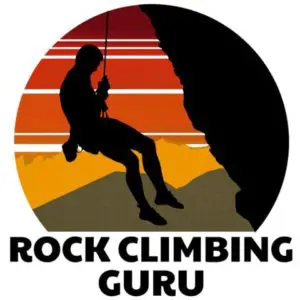When you are a beginner climber, you may wonder exactly when you will be able to call yourself an intermediate. To know the answer to this, we first must answer what exactly a beginner climber is.
As a general rule, a climber is considered a beginner when they have been climbing for less than 6 months and climb between 5.0 and 5.9 on the YDS. Beginner climbers will typically have a basic understanding of rock climbing fundamentals and can perform rudimentary techniques.
While it may be easy to determine how skilled a climber is based on their climbing grade, this is not the best way to classify who is a beginner and who isn’t. In this article, I discuss why being classified as a beginner doesn’t just depend on one’s climbing ability.
Who is Considered a Beginner Climber
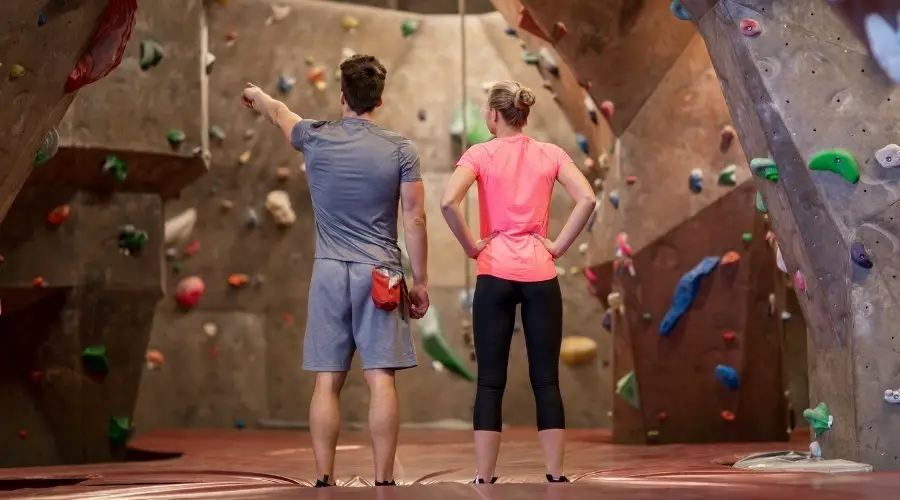
Defining who qualifies as a beginner and who doesn’t is a much more daunting task than it appears to be. I feel like there are three different categories that should be used to classify the different level of climbers:
- Ability – What is their climbing ability and maximum climbing grade.
- Experience – How long they have been climbing and at what frequency.
- Knowledge – How much they have learned and what technical skills they have accumulated.
In order to be classified as a beginner, you need to fit the definition of a beginner in at least 1 of these categories. Most beginners will fit into multiple of them. It is not required to fit into all of the definitions to be classified as a beginner.
So without further ado, let’s dive into each category and discuss what being a beginner means in each.
Climbing Ability
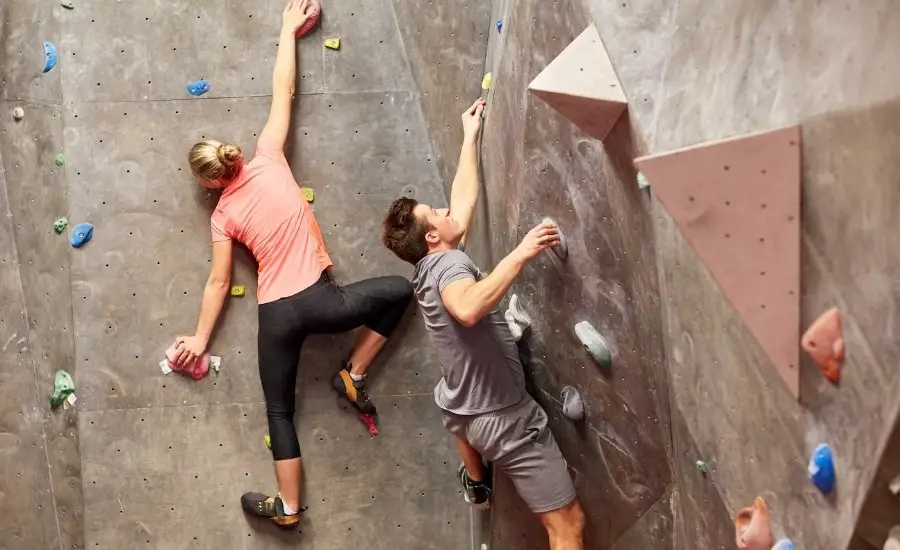
A climber’s ability is perhaps the most objective and straight forward way of measuring their level out of the three categories. That being said, I do not believe it alone can be used to classify a climber.
The International Rock Climbing Research Association (IRCRA) wrote a Position Statement in which they defined climber categories (lower, intermediate, advanced, elite, higher elite) based on climbing grade difficulty. The results of which are as follows:
Beginner climbers are able to climb between 5.0 and 5.9 on the Yosemite Decimal System (YDS). This corresponds to approximately between 1 and 5 on the French/sport scale.
While this provides a good set of guidelines, it should not be taken as the only classification method.
I have seen elite athletes walk into a climbing gym for the first time and climb 5.10a without any climbing specific training. On the other hand, I have seen climbers who have been climbing for the past 2 years and still have not been able to reach that level.
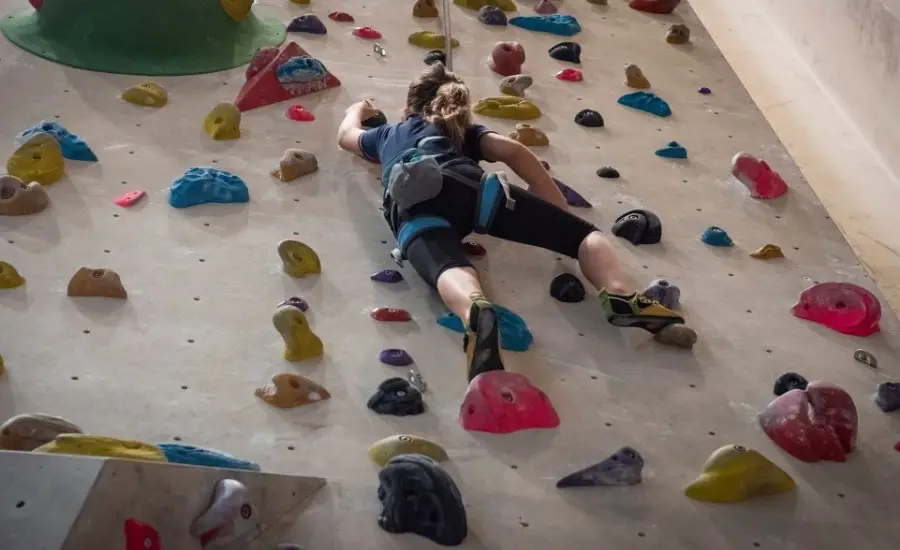
I do not believe we should classify a first time climber who can send 5.10a as an intermediate climber. Although very talented, they do not possess any climbing knowledge or experience. These are two very important factors to consider determining if a climber is a beginner or not.
Climbing Experience
Climbers falling into the beginner category will have the least amount of climbing experience of the three (beginner, intermediate, advanced). That being said, some beginners will have quite a substantial amount of more experience under their belt than others.
The more experience one has climbing, the more they become a part of the climbing community. Unfortunately due to time or financial restraints, climbers are typically able to go climbing one time (maybe 2 times) per week. This extends the amount of time required to gain a decent amount of experience in the sport.
Beginner climbers will typically have less than 1 year of climbing experience. Climbing more frequently (i.e. 2-3 times a week) will shorten this timeframe to approximately 6 months. Any climber with less than 6 months of climbing experience is considered a beginner.

The full extent of climbing can not be experienced in just a few sessions. Having a good experience base is necessary to learn and completely understand the different climbing types and techniques.
Climbing Knowledge
I do not mean climbing knowledge in the sense of knowing the history of climbing. Rather I am referring to knowing the equipment, terminology, types, techniques, and skills associated with climbing.
As you gain climbing experience, you will also be gaining climbing knowledge. Unless of course you decide to bury your head in the sand and purposely avoid learning.
That being said, you cannot base climbing knowledge solely on experience. A climber may have years of experience bouldering in a gym but may never have sport climbed a day in their life. If you ask them to teach you how to clip properly or how to belay, they will have no clue.
They have an overall beginner knowledge base of climbing. (But are most likely advanced in regard to their bouldering knowledge).
Having a base of climbing knowledge and its fundamentals across multiple disciplines is necessary to be considered an intermediate.
Beginner climbers will typically have a rudimentary understanding of the fundamentals of rock climbing. They will know the basic terminology and be able to identify different climbing holds, grips, and moves. Additionally, they will be able to perform simple techniques such as edging, matching, and flagging.
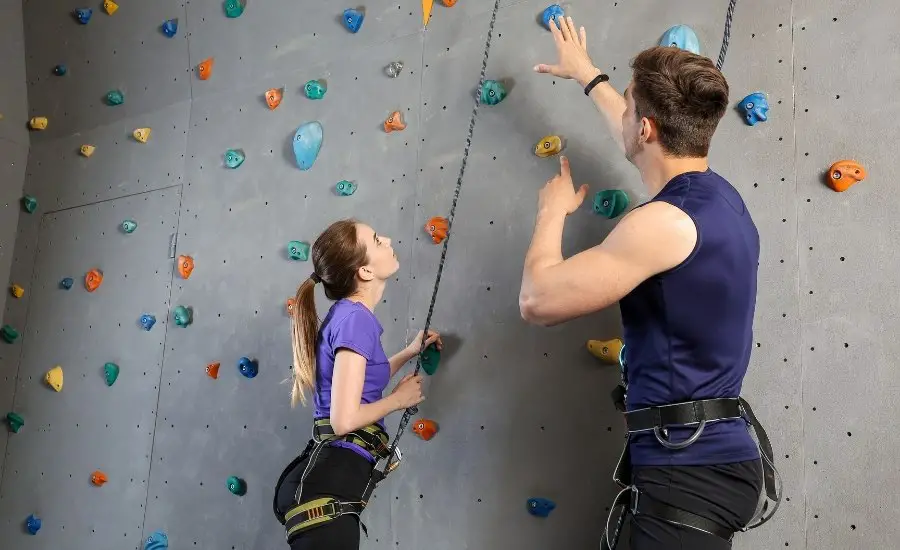
Having a genius level intellect is not necessary to go from a beginner to an intermediate in climbing knowledge. All that is required is familiarizing yourself with the sport and actively seeking out new information about it. Eventually you will have amassed enough knowledge and skills to be considered an intermediate.
The Bottom Line
Beginner climbers will typically be able to climb between 5.0 and 5.9 but there will always be exceptions to this. Climbing above this level does not automatically make a climber an intermediate. To be an intermediate climber, one must have been frequently climbing for at least 6 months. In addition to having this experience, the climber should know the fundamental concepts of rock climbing.
While I know everyone wants to progress to the next level right away, it takes some time to do so. Be patient, you will get there if you haven’t already.
